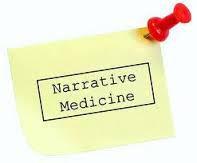 Narrative Medicine is the essence of clinical diagnoses which basically comes down to storytelling. If the physician, surgeon or psychiatrist is open-minded and knows the art of listening, he/she comes in contact with patients who are seeking help with a health problem and in my opinion: a health problem can be defined as a story. The patient relates an issue from beginning to end and the way the doctor interprets it, is the story with a beginning, a middle, as well as an end. By listening and using a bit of prompting, the physician can get the patient to reveal details enabling him/her to arrive at a diagnosis. Unfortunately, many patients are bad storytellers. They are anxious and talk generally instead of specifically and are often vague about details. Doctors on the other hand are often impatient and busy glancing at the wall clock de to deadlines they have to meet. I have read studies that show how a skilled listener can assist most patients to get their stories out quite quickly when not interrupted by a doctor who asks bombards his patient with too many questions at once. The doctor has to be skilled at assessing his/her patient’s ability at giving accurate information.
Narrative Medicine is the essence of clinical diagnoses which basically comes down to storytelling. If the physician, surgeon or psychiatrist is open-minded and knows the art of listening, he/she comes in contact with patients who are seeking help with a health problem and in my opinion: a health problem can be defined as a story. The patient relates an issue from beginning to end and the way the doctor interprets it, is the story with a beginning, a middle, as well as an end. By listening and using a bit of prompting, the physician can get the patient to reveal details enabling him/her to arrive at a diagnosis. Unfortunately, many patients are bad storytellers. They are anxious and talk generally instead of specifically and are often vague about details. Doctors on the other hand are often impatient and busy glancing at the wall clock de to deadlines they have to meet. I have read studies that show how a skilled listener can assist most patients to get their stories out quite quickly when not interrupted by a doctor who asks bombards his patient with too many questions at once. The doctor has to be skilled at assessing his/her patient’s ability at giving accurate information.
Dr. Ross Pennie, has been a surgeon in the jungle, an intensive-care pediatrician, a specialist in infectious diseases and a university professor and he says that drawing out the story and coming to a diagnosis, is comparable to playing a musical instrument. He feels that too many doctors today are not interested in stories, rather, they become seduced by the razle-dazzle of high-tech interventions and summon the latest kit of diagnostic toys before the patient has barely opened his/her mouth. Without the guidance of an eloquent story, the fancy gadgets in hospitals are no better than a shot in the dark when it comes to making the all-important diagnosis. Aiming the MRI machine at the wrong body part produces no meaningful results.
Here is an example of the power of narrative. ‘I received a call by an emergency physician who asked me to meet a young couple who didn’t look very ill but had fevers and a nasty, red rash.’
‘Where have they been recently?” I asked. The doctor did not know but said he’d send a medical student to find out and then call me back.
‘They were on honeymoon,’ the student told me.
‘But where did they spend their honeymoon?’ I asked. He didn’t know but soon returned with an answer.
‘The Caribbean,’ he said.
‘Which Island?’ I needed to know. He sighed, went back to the couple then returned with the information that he should have given me in the first place. ‘The Grand Bahama Island.’
All I had to do was Google it and discovered that the Bahamas were in the throes of a massive epidemic of mosquite-borne Dengue virus infection which causes fever and rashes and can sometimes be fatal.
I jumped into my car and drove to the hospital where the couple were sitting and waiting. I introduced myself and requested permission to examine them. I knew where to look for mosquito bites hiding within their more obvious red Dengue rash. We’d made a timely diagnosis without performing a single lab test. We knew that their blood pressure and clotting factors might fall to dangerously low levels within the next few hours (the bride’s did) and that they might need massive doses of I.V. fluids to avoid going into shock. The bride needed treatment for three days.’
‘I have been privileged to literally catch people at the instant they were born, comfort then during the hours before their deaths, and struggle beside them during much of the drama inbetween. So, how could I be anything but fascinated by great stories?’
